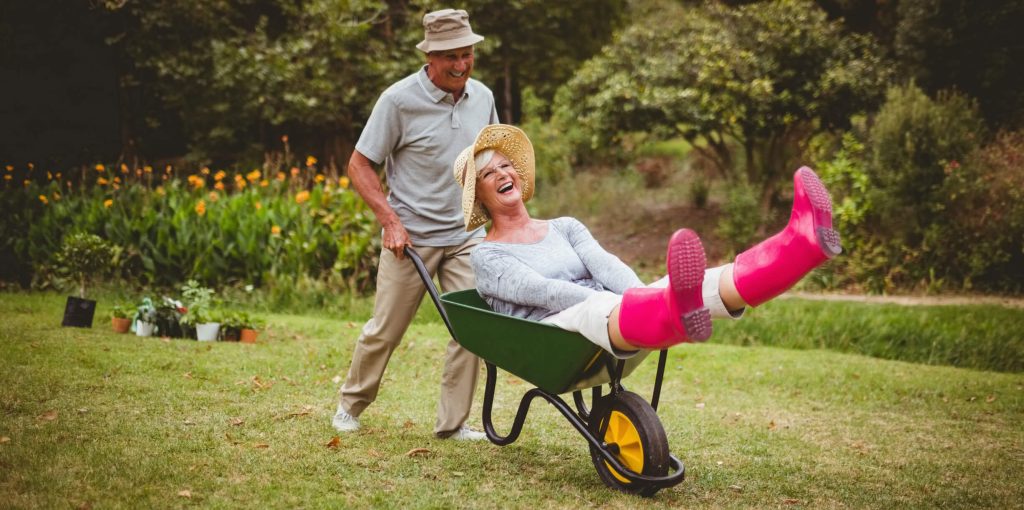In many ways, stress doesn’t care about our age. We experience it at every life stage, albeit in different ways, and as we get older, new stressors are introduced: We may face the loss of loved ones, financial uncertainty, declining mobility, and the threat of losing our independence.
Some amount of stress is okay, good even, Healthline tells us. But left unchecked, a mind that is always wound-up will only hurt your health. Studies show that failure to manage stress in a healthy way can contribute to high blood pressure, weight gain, insomnia, and a weakened immune system. It can also bump up your risk for heart disease and Alzheimer’s.
Excess stress is usually easy to identify. Watch for common symptoms like heart palpitations, persistent headaches, indigestion, and irritability. You may also experience chest pain, fatigue, and muscle tension.
Thankfully, stress is something we can work on. With the right tools—and the right mindset—you’ll be able to get your mental health back on track. So take a deep breath, and let’s dive into some simple ways older adults can manage stress.
1. Establish an Exercise Routine
One of the simplest ways to lower stress is to get moving. Exercise is a natural mood booster that raises the brain’s production of “feel-good” endorphins. It also improves sleep, helps with balance, minimizes Alzheimer’s risk, and boosts our confidence.
Fortunately, there’s no need to start marathon training (unless you’re into that!). According to the Mayo Clinic, any activity that gets your heart pumping and your body moving can be beneficial, so don’t be discouraged if your stamina isn’t what it used to be.
Simple, low-impact exercises like walking, swimming, and cycling can make a world of difference. Plus, by doing what you enjoy (and not what you think you should enjoy), you’ll be more likely to stick with it.
For older adults, the CDC recommends 150 minutes of moderate-intensity exercise per week. We suggest picking something you like to do that matches your own level of fitness. Some ideas to consider include:
- Weightlifting
- Stair-climbing
- Dancing
- Yoga
- Pilates
- Tai Chi
- Gardening
- Swimming and water aerobics
Another way to stay motivated is finding a friend who will exercise with you. The buddy system helps hold us accountable, and it makes things more fun. Plus, socializing adds to the stress-reducing quality of your exercise routine, which we’ll expand upon next.
2. Find a Healthy Social Outlet
Having a strong sense of community has been shown to bolster our resilience to stress. Unfortunately, social ties often diminish as we get older and experience things like the death of a spouse, changes in living arrangements, and transportation challenges.
To avoid self-isolation and the stress that comes with it, older adults should make it a priority to socialize on a regular basis. There are countless ways to do this. You can sign up for a cooking class, join a crafting club, try your hand at trivia, or tag along at a birdwatching weekend—whatever you’re into, there are others who are into it, too.
3. Practice Mindfulness
For many of us, staying mindful can be a constant struggle—but it’s well worth the effort. By focusing on the present and becoming aware of your immediate surroundings—not the distant past or an intangible future—you can ground yourself in a more peaceful state of mind. Habitual mindfulness can can even lower blood pressure and make pain more tolerable.
Like exercise, mindfulness also acts as a sleep aid. One study revealed that mindful meditation improved the sleep quality of older adults with insomnia. And because a good night’s sleep is so critical for stress management, practicing mindfulness becomes even more appealing.
Mindfulness takes many forms. You might try meditation, prayer, yoga, or mindful breathing exercises. You can even incorporate mindfulness into your day-to-day activities by striving to be more present while eating, completing chores, or socializing.
4. Eat Nutritiously Dense Foods
The foods you eat have a direct effect on your brain health. B Vitamins, in particular, are important for mitigating symptoms of depression, stress, and anxiety. So, loading up on broccoli, cauliflower, beans, and legumes is one easy (and delicious) way to combat stress.
The Cleveland Clinic explains that a Mediterranean-style diet is ideal for lowering cortisol levels. For better mental health, we suggest stocking your kitchen with lean proteins (fish and poultry), healthy fats (avocados, nuts, salmon, and olive oil), whole grains, and plenty of fruit and veggies. Magnesium-rich foods have also been shown to help with stress; good sources include spinach, dark chocolate, bananas, and pumpkin seeds.
5. Play With Pets
Not that we need more reason to spend time with our furry favorites, but being around animals is actually good for our mental health. Studies reveal that spending time with an animal companion can relieve stress by lowering blood pressure and cortisol levels. Animals may reduce feelings of loneliness as well.
If you’re able to get a pet of your own, it could lend a major boost to your overall health and happiness. However, be honest with yourself about your ability to care for an animal. Owning a pet is demanding physically, financially, and time-wise. That said, the benefits of pet ownership often outweigh the negatives.
Of course, you don’t need a cat or dog of your own to reap the benefits of animal companionship. Try getting together with a pet-owning friend, or look for pet therapy programs near you. At Provision Living, residents routinely enjoy such programs and are welcome to have pets in their own apartments.
Enjoy Worry-Free Living at Provision Living
As you can see, older adults face continual threats to their mental health—so don’t make transitioning to a new home one of them. Provision Living offers residents and their loved ones the peace of mind that comes with a secure and well-rounded community. To see what that might look like for you, speak to one of our care consultants today.


